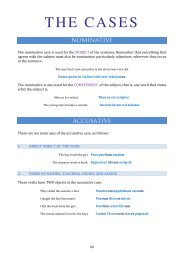Microsoft Word – FGB§2 verbs
Microsoft Word – FGB§2 verbs
Microsoft Word – FGB§2 verbs
You also want an ePaper? Increase the reach of your titles
YUMPU automatically turns print PDFs into web optimized ePapers that Google loves.
VERBS NOT FOLLOWED BY A PREPOSITION<br />
These <strong>verbs</strong> are following by an INFINITIVE without any preposition between them. Most of<br />
them are followed by ‘to’ in English.<br />
sembler to seem to Il semble ne pas vouloir le faire<br />
daigner to deign to Elle a daigné nous parler<br />
aimer autant to like just as much to J’aime autant le lire<br />
avouer to admit to Il a avoué en être coupable<br />
aller to go to Nous allons le faire maintenant<br />
savoir to know how to Ils ne savaient pas le traduire<br />
retourner to go back to Il est retourné payer la facture<br />
croire to believe Je crois pouvoir le faire<br />
courir to run to Il a couru prendre le train<br />
revenir to come back to Il est revenu me le dire<br />
envoyer to send to Je l’ai envoyer chercher le médecin<br />
venir to come to Je suis venu vous voir<br />
faire to have something done Elle s’est fait couper les cheveux<br />
aimer to like J’aime lire les journaux<br />
prétendre to claim Il prétendait être l’héritier<br />
oser to dare to Vous n’oserez pas le lui dire!<br />
faire bon to be nice Il fait bon s’asseoir au soleil<br />
penser to intend to Je pense le revoir demain<br />
pouvoir to be able to Je pourrai vous le dire plus tard<br />
avoir beau to be of no use Vous avez beau vous plaindre<br />
falloir to be necessary Il faut finir l’exercice<br />
aimer mieux to prefer to J’aime mieux partir tout de suite<br />
préférer to prefer to Je préfère partir tout de suite<br />
être censé to be supposed to Vous êtes censé étudier ce soir<br />
devoir to have to Nous avons dû le finir<br />
laisser to allow to Laissez-moi le faire tout seul<br />
paraître to appear to Cela paraît être facile<br />
faillir to be close to/nearly Il a failli tomber (he nearly fell)<br />
Exercise 66 [<strong>verbs</strong> not followed by a preposition]<br />
1 He seems to be pleased with the news.<br />
2 They deigned to admit us to their house.<br />
3 We might as well write it now.<br />
4 The teacher admitted to being wrong.<br />
5 We are going to tell her.<br />
6 I know how to translate this.<br />
7 The boy couldn’t swim.<br />
8 They went back to apologise.<br />
9 We think we’re right.<br />
10 The woman ran to catch the bus.<br />
11 He’s come back to let us know.<br />
12 They sent for the vet.<br />
13 I’ve come to inform you of our decision.<br />
14 We’re having a new garage built.<br />
15 You must get your hair cut.



